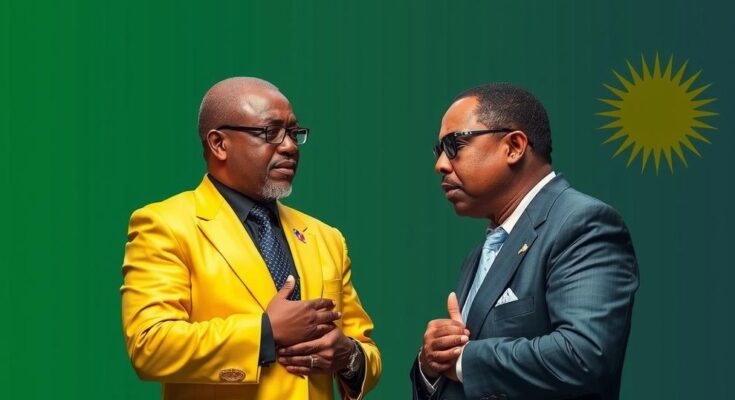Namibia’s IPC, led by candidate Panduleni Itula, has rejected the election results due to serious logistical failures and alleged electoral malpractice. Voting delays and technical difficulties have marred the process, prompting calls for justice. The incumbent Swapo party’s candidate, Netumbo Nandi-Ndaitwah, leads with 48% of the vote, while Itula claims 30%. The IPC’s refusal to recognize the outcome indicates a significant political rift amid past electoral declines for Swapo.
Namibia’s primary opposition party, the Independent Patriots for Change (IPC), has announced its refusal to accept the results of the recent general election due to significant logistical challenges and procedural irregularities. Panduleni Itula, the presidential candidate for the IPC, asserted that the electoral process exhibited “glaring and undeniable” malpractices. The electoral commission’s setbacks forced voting to extend beyond the originally scheduled period, with numerous complaints of ballot shortages and technical malfunctions surfacing as the process unfolded.
The elections commenced on a Wednesday, but voting was still taking place through Saturday in several areas. Opponent Netumbo Nandi-Ndaitwah from the ruling South West Africa People’s Organisation (Swapo) is vying for the presidency, aiming to become Namibia’s first female president. Current tallies indicate Nandi-Ndaitwah has received 48% of the votes, while Itula trails at 30%. A candidate requires a majority for an outright victory to avoid a runoff, heightening the stakes as IPC contests the legitimacy of the electoral outcome.
In light of their grievances, Itula called upon citizens affected by the voting irregularities to take legal action, encouraging those who felt disenfranchised to report incidents to law enforcement. He firmly stated, “We shall not, under any circumstances, recognise the outcome of the 2024 election… that is still, in our opinion, illegitimately continuing.” Namibia is witnessing a period of political tension, reminiscent of challenges faced by similar parties in the southern African region.
The political landscape in Namibia has been dominated by the South West Africa People’s Organisation (Swapo) since the nation gained independence from South Africa in 1990. The IPC, established recently, is positioning itself as the main opposition voice against Swapo’s long-standing authority. Recent elections have revealed electoral decline for Swapo, which saw a drop below 60% support in the 2019 elections, indicating a shift in the political dynamics as citizens seek change. The 2024 election results, marred by reported irregularities, have raised questions regarding electoral integrity in Namibia.
The refusal of the IPC to recognize the election results highlights significant issues surrounding electoral procedures in Namibia. With assertions of malpractice and calls for justice, the political situation remains fraught with tension as both parties await further developments in the election tally. The IPC’s commitment to pursuing legal recourse signifies the growing discontent among opposition factions within the political framework, hinting at potential challenges to Swapo’s authority moving forward.
Original Source: www.bbc.com




